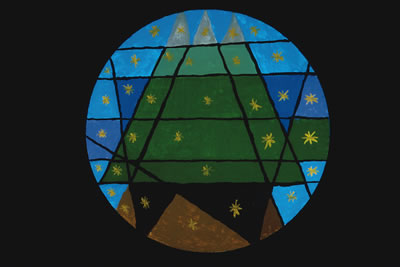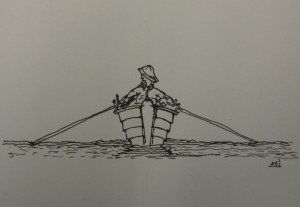Shalom is a Hebrew word that means peace.
It is also the name of an organization in Portland, Maine that has brought peace of mind to thousands of people affected by mental illness.
A man watched his brother struggle with mental illness and move from one family member’s home to another and then to mental hospitals and finally to shelters. His dream was to create a safe, caring place that would allow individuals like his brother to live within the community. That dream became a reality when Shalom House opened on High Street in 1972.
In the beginning, there was only the one house with 15 beds but today, 40 years later, Shalom House owns and operates at least two dozen properties in Cumberland and York Counties. It offers temporary and long-term supported and independent housing. In addition, it provides a wide array of support services such as community integration, skills and peer support.
According to Executive Director Mary Haynes-Rodgers, “From the beginning, Shalom House made its mission of providing both mental health and housing services the hallmark of what makes us different. It is the focus on both of these services that allows us to ensure our consumers have the opportunity to live and thrive in our community while continuing in their own recovery.”
The first time I visited Shalom House’s administrative offices I was surprised and delighted to see something else that was thriving —a big beautiful papier-mâché giraffe perched behind the reception desk.
I looked around and realized there was art everywhere!
It turns out that along with housing and support services, Shalom operates a robust art program in a large mixed media studio. The program began in 1994 and is led today by Tenney Swift.
A Maine College of Art graduate, Tenney spent six years facilitating an art program for adults with developmental disabilities. In 2007, Shalom House approached her about running its program. When she met some of the people at Shalom and got a look at the studio space, she jumped at the opportunity.
The program is open to anyone with a diagnosed mental illness — anyone, not just Shalom House clients. There is a modest tuition that adds up to a couple of dollars a class, but scholarships are available. And even if you don’t consider yourself an artist, who knows what you are capable of creating!
Kristin Cartwright has been attending the program since 2009. Right now she’s working on a magnificent-looking lion she hopes will eventually find a home at The Barbara Bush Children’s Hospital.
Kristin suffers from major depression and has a strong tendency to isolate herself. She tries to get to the program from her home in Saco at least once a week — she considers it that important.
“It’s a social connection,” she explained to me. “Because of my tendency to isolate, I don’t really have friends outside of the art class. Here I have people to talk to, I’m not alone. It was a big step to come in the first place. I had a support team that encouraged me to get here. I enjoy it. I enjoy doing crafts, creating things, and drawing. It’s not just painting and drawing, it’s working with metal and pottery and wire.”
“I want people to understand that this is a facilitated working studio space,” says Tenney. “I am the facilitator. I don’t stand up and lecture. I want the pressure off, so people are more inclined to come in. You can jump into a group project at any time and you can work on your own projects, too. For some people, it’s almost like coming in and directing their own therapy. They might choose a project that helps quiet their own symptoms. In a way, you’re in the driver’s seat with your own art therapy.”
The lion, which is made out of wire and paper and wallpaper paste, is supposed to be a group project, but Kristin has been doing most of the work. It makes her feel good to create something that someone appreciates.
Like Kristin, Joe Walker says attending the art program has been a wonderful outlet and a place to talk with other people. Joe is a recovering alcoholic who also suffers from depression. On top of that, a year and a half ago he developed spinal meningitis and wasn’t expected to live. He was in a coma, and when he came out of it was paralyzed from the neck down. He’s come a long way, but still walks with a cane. Shalom House and the art program are helping him heal on many levels.
“I’m not sure how well I would have done without everything Shalom House has given me, in particular, my counselor,” Joe told me. “I was an alcoholic for a long period of time and I was one of those alcoholics who lost everything. I had never learned to manage profound depression properly and I was just a big huge mess when I got sober. My attitude is I’ve got a big long bridge to get across and I just couldn’t do it alone. Shalom House has helped me.”
An architect by trade, Joe started doodling at support group meetings and people began to encourage him to do something with them. Someone else encouraged him to join Shalom House’s Art Program. “Tenney has been incredible,” he says. “It’s amazing. I’ve never given myself credit for being good at anything, and I’m starting to develop a sense of self-worth for the first time in my life. I realized that I’m good at what I do.”
Tenney couldn’t be any more delighted to hear what the program means to Kristin and Joe. “My number one focus is getting people to feel confident putting their own artwork out there and to also feel confident pricing their own artwork and becoming independent. And I want them to enjoy it here and keep coming back.”
“People who live with mental illness are often defined by their disability rather than their ability, “says Shalom’s Development Director Jill Silander. “The art program strives to break down barriers and to help remove the stigma that can separate those with mental illness from the community at large.”
Last year more than 70 people participated in the program. Their artwork is not only on display at Shalom, it is also loaned to other agencies and area businesses, shown at various art shows, turned into art cards and calendars, and used in various Shalom House publications.
If you’d like to participate in the Shalom House Art Program, help support it in any way, or just get more information, contact Shalom House at (207) 874-1080 or send an email.
Before I sign off, here are two of Joe’s drawings — the one on the left is the quick sketch he did for me. Signed, so I’ll have proof I knew him when. Thank you, Joe!
And thank you Shalom House Art Program.









Leave A Comment